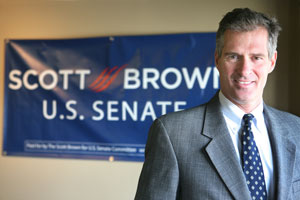
Flickr/<a href="http://www.flickr.com/photos/statesenatorscottbrown/4163375103/">Scott Brown</a> (Publicity photo).
Sen. Scott Brown (R-Mass.) sure is enjoying his moment in the sun. He was one of the key votes on financial regulatory reform, and now a crucial target for supporters of the DISCLOSE act, a bill that attempts to deal with some of the consequences of the Supreme Court’s corporations-can-spend-whatever-they-want-on-elections Citizens United decision.
Basically, DISCLOSE would require companies to stand behind the ads they buy—”I’m Tony Hayward, the CEO of BP, and I approved this message.” If the Dems can’t get Brown on DISCLOSE—an already watered-down collection of half-measures—getting past a GOP filibuster is going to be close to impossible.
Brown said this week that he won’t support the new law. The transparency groups that back DISCLOSE—campaign finance reformers like Democracy 21, Common Cause, and Public Citizen—are still begging the rookie senator to change his mind (or at least oppose a GOP filibuster). But you can tell by the tone of their latest letter to the senator that things aren’t going so well:
The 2010 congressional elections are expected to involve hundreds of millions of dollars being spent by corporations, labor unions, advocacy groups and trade associations to influence the voters’ decisions. Voters have a basic right to know who is behind the money being spent in their elections, as the Supreme Court made clear in the Citizens United decision.
You have stressed the importance of government transparency and accountability in the past, so we are understandably puzzled by your response indicating you would not vote for the DISCLOSE bill, without which voters will not be able to know who is financing the flood of campaign ads expected during the 2010 congressional elections.
You can read the rest of the letter here. I don’t expect Brown to change his mind without significant public pressure from constituents back home in Massachusetts. Blocking DISCLOSE and other campaign finance laws is a top priority of Brown’s party boss, Senate Minority Leader Mitch McConnell. (McConnell has a history of filing lawsuits to block campaign finance laws.) Brown’s votes so far show that he clearly has an interest in being reelected—he’s tried to make some compromises with Dems. In this case, pressure from other Republicans probably outweighs letters from reform groups. Without massive public outcry in Massachusetts, DISCLOSE could be done for.
Over at HuffPo, Sam Stein reports that Dems still plan to bring DISCLOSE to the floor of the Senate this month because “it is too important not to.” But the same piece also notes earlier comments from Dem aides saying they had put all of their eggs “in the Brown basket,” and acknowledges that there’s been “little indication” that either Olympia Snowe or Susan Collins of Maine might support the law.
The only solace for Brown haters, really, is that he probably won’t be in this powerful Ben-Nelson-on-health-care-like position for long. After the November elections, it’s almost certain that some other senator (Charlie Crist? Mark Kirk? Linda McMahon?) will represent the 60th person the Dems need to convince if they want to pass any legislation. Brown won’t be the center of attention forever.









